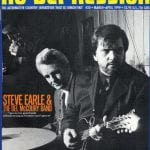Like The Night: Bob Dylan And The Road To The Manchester Free Trade Hall
It would be difficult to exaggerate the impact of Bob Dylan’s decision to move away from folk music and plug in to rock ‘n’ roll. But judging by British writer C.P. Lee’s new book, it could be easy to exaggerate the singular importance of the singer’s Manchester performance of 1966.
Between January 1965 and March 1966, Dylan recorded three peerless albums (Bringing It All Back Home, Highway 61 Revisited and the double-album Blonde On Blonde) and joined up with a rowdy roadhouse quintet called the Hawks (later known as The Band) to road-test his new sound before often hostile crowds.
The high drama of Dylan’s entire “electric” escapade is fine fodder for a book, but Lee largely narrows his focus to a single performance — May 17, 1966, at Manchester’s Free Trade Hall, where Dylan willingly sparred with naysayers who branded him “Judas.” Lee, who attended that performance, views the gig as a showdown between the mercurial artist and a stodgy British folk tradition bent on dispensing Dylan some tough love. Despite an often stilted narrative, interviews with audience members and Lee’s archival research bring much of the fervor of that night back to life.
The flaw in Like The Night is its assumption that the spectacle at the Free Trade Hall was a unique fusion of Dylan and that particular audience. In fact, a listen to other bootlegs from the tour shows that on any given night, Dylan and company were as chaotic and inspired, and audiences could be just as peevish.
The Manchester show has assumed mythical status for one reason: Columbia taped the show but chose for more than 30 years to leave it on the shelf (it was officially issued a few months back as Live 1966: The “Royal Albert Hall” Concert). Thanks to bootleggers who for decades issued incorrectly attributed versions of the Manchester show, it has become a widely circulated secret document, something that enhanced its cachet among Dylan’s fans.
There is no doubt that the performance preserved on Live 1966 and celebrated in Lee’s book is great. But crediting the Manchester audience with bringing out the best in Dylan shortchanges other influences — like, say the Hawks. Surely, with their skill and fire, they brought something to the party.




